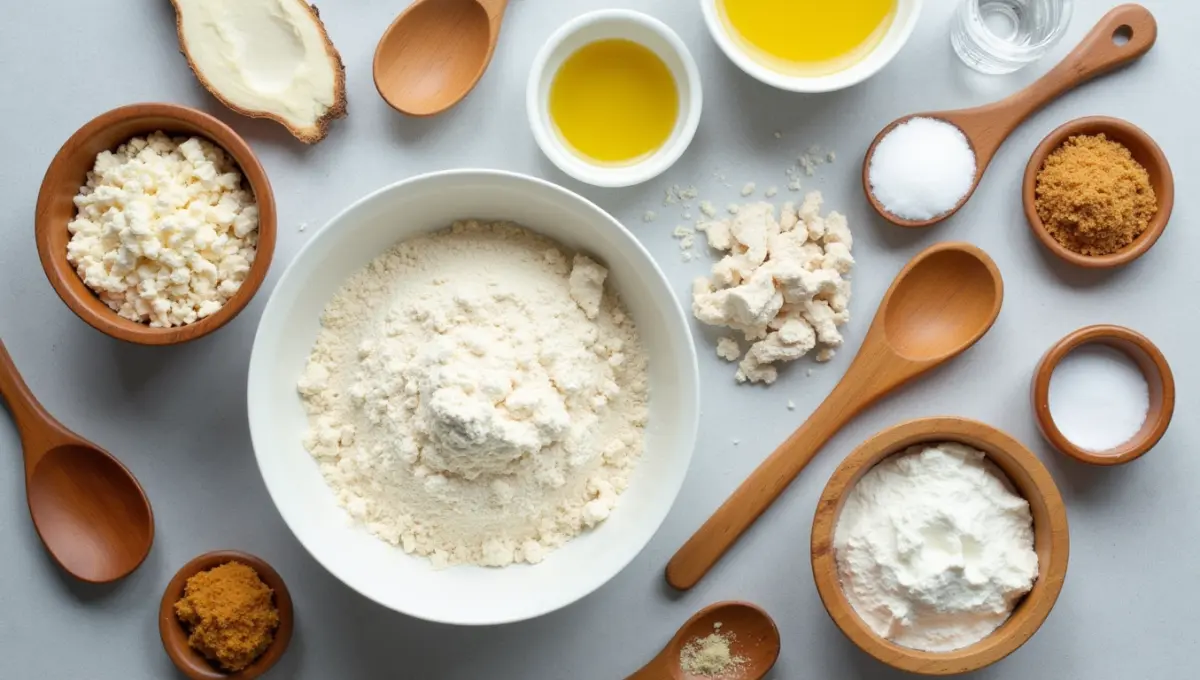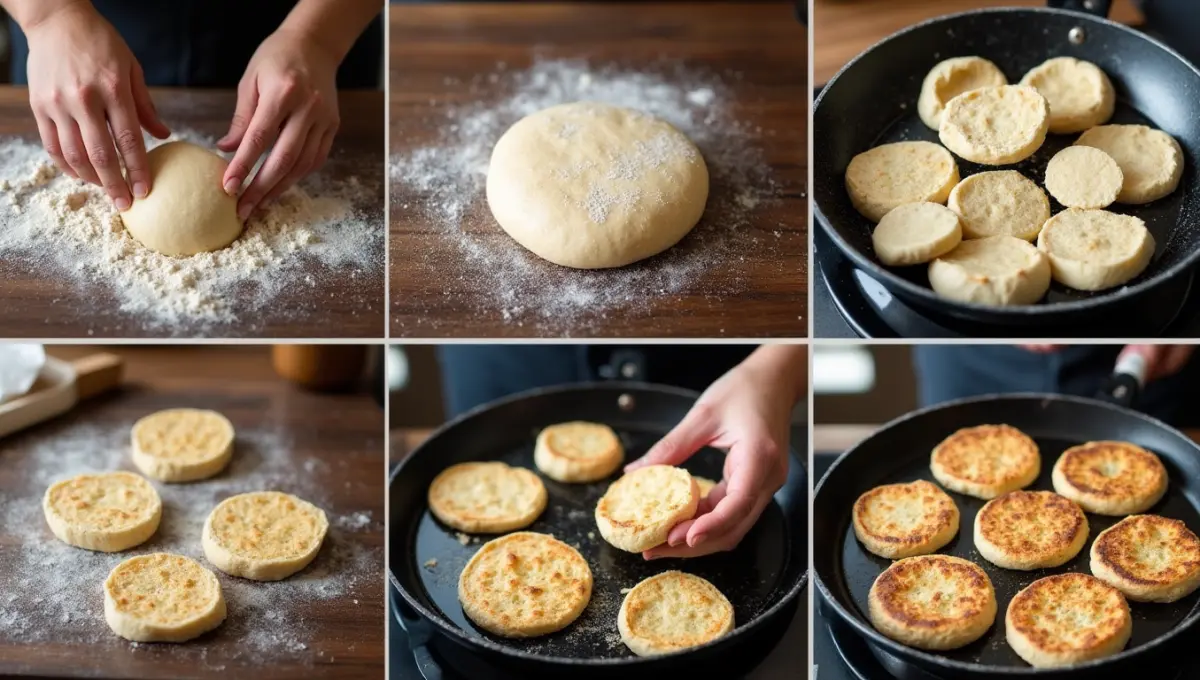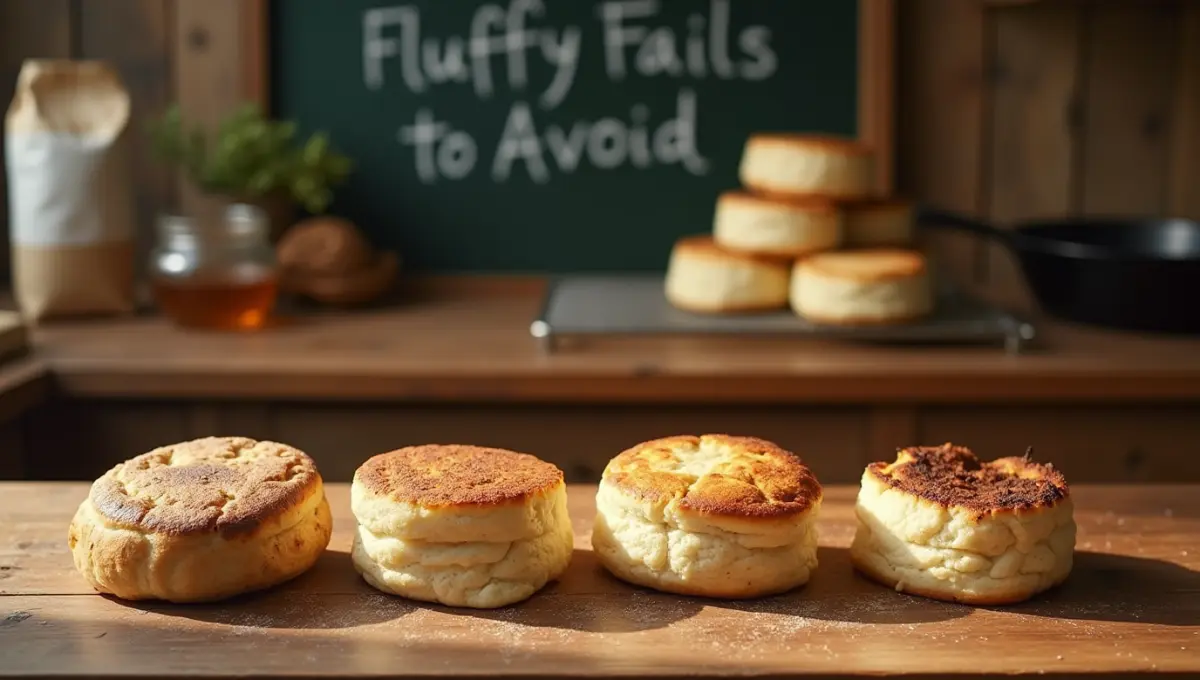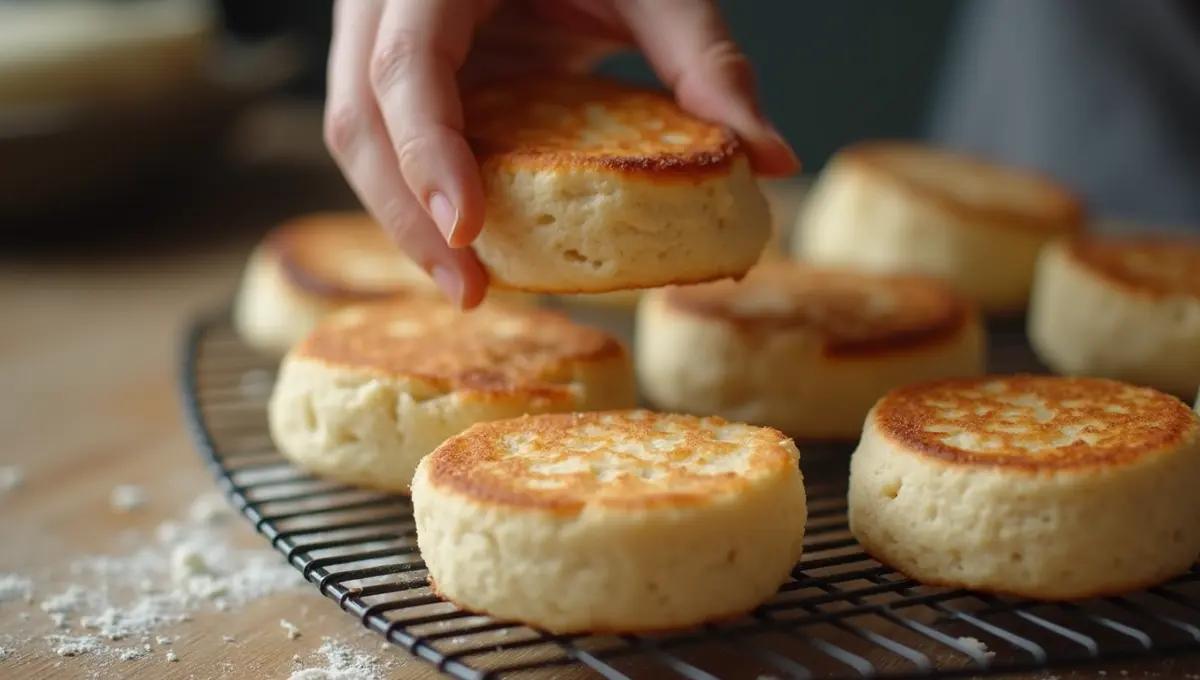If you’ve ever bitten into an English muffin expecting that signature fluffy texture—only to be met with a dense, doughy letdown—you’re not alone. That’s exactly why I created this English Muffin Recipe with Einkorn Flour: to bring you a soft, airy, plant-based version that’s every bit as satisfying as the classic.
Made with vegan-friendly, wholesome ingredients and ancient-grain einkorn flour, this recipe is perfect for anyone following a plant-based lifestyle or looking to clean up their morning routine. But here’s the thing—getting that perfect texture isn’t just about the ingredients. Avoiding just 4 common baking mistakes can be the difference between sad and spectacular. Let’s dive in and explore more plant-based recipes to elevate your breakfast game!
What Makes Einkorn Flour Special?
Einkorn flour is gaining well-deserved attention in the world of whole food and plant-based baking—and for good reason. As the oldest cultivated form of wheat, einkorn is considered an ancient grain, unaltered by modern hybridization. This means it retains its original nutritional integrity, offering a range of benefits that make it especially valuable for health-conscious bakers.
Whether you’re exploring ancient grain recipes or seeking a better alternative to standard flour, this English Muffin Recipe with Einkorn Flour brings both flavor and function to your plant-based kitchen. Here’s why:
1. Einkorn is Easier to Digest Than Modern Wheat
One of the standout features of einkorn is its simpler gluten structure. While it still contains gluten, it’s a different type than that found in modern wheat. Many people with gluten sensitivity—not celiac disease—report better tolerance when eating einkorn-based recipes. This makes it a strong candidate for anyone looking to reduce digestive discomfort without going fully gluten-free. Try our gluten-free sugar cookie recipe for a completely gluten-free alternative.
2. It’s Packed with Nutrients and Natural Flavor
Einkorn flour is rich in protein, essential fatty acids, and antioxidants like lutein. Unlike refined flours, it contains more nutrients per serving, which makes it a natural fit for those embracing whole grain breakfast recipes. Its slightly nutty, buttery flavor also enhances baked goods without the need for heavy sweeteners or dairy, aligning beautifully with plant-based and vegan-friendly cooking principles.
3. Einkorn Supports Cleaner, Non-GMO Baking
Because einkorn is a pure, original species of wheat, it is naturally non-GMO and often grown using organic or traditional farming practices. For readers committed to clean eating or seeking out non-GMO grains, this makes einkorn an ethical and health-forward choice for everyday recipes.
4. Ideal Texture for Vegan Baking
In plant-based baking, structure and rise can be a challenge—especially when you’re not using eggs or dairy. Einkorn’s high protein content and natural elasticity offer a reliable texture for muffins, breads, and other baked goods. In this English Muffin Recipe with Einkorn Flour, it helps create a soft, fluffy interior with just the right chew—no eggs required. Check out our vegan baked mac and cheese recipe for more plant-based inspiration.
Ingredients You’ll Need

To make this soft and fluffy English Muffin Recipe with Einkorn Flour, you’ll need simple, plant-based pantry staples. These ingredients are not only vegan-friendly but also align with a whole food lifestyle. Below is a structured ingredient list optimized for search indexing. For precise measurements, I recommend using a kitchen scale to ensure perfect results every time.
- 2 cups einkorn flour: Use freshly milled or store-bought for best flavor and texture.
- 1 tablespoon coconut sugar: Or substitute with maple sugar or date sugar for refined sugar-free option.
- 1 teaspoon sea salt: Balances flavor and enhances the natural nuttiness of einkorn flour.
- 1 tablespoon active dry yeast: Ensure it’s fresh and active for a good rise.
- ¾ cup warm non-dairy milk: Such as unsweetened almond milk, oat milk, or soy milk—this replaces dairy milk and supports vegan baking.
- 1 tablespoon olive oil: Or melted coconut oil for a richer taste—adds tenderness and moisture.
- ¼ cup warm water (as needed): Adjust to get a soft, slightly sticky dough—einkorn absorbs water differently than modern flour.
- Optional: Cornmeal for dusting: Gives the bottom of each English muffin its classic texture and prevents sticking while cooking.
Each ingredient plays a key role in ensuring the muffins turn out soft, fluffy, and flavorful—true to what you’d expect in a traditional English Muffin, but made entirely with wholesome, plant-based components.
Step-by-Step Instructions

Follow these simple steps to make your own soft and fluffy English Muffin Recipe with Einkorn Flour at home. Each step is designed to guide you through the process smoothly. A non-stick skillet is perfect for cooking these muffins evenly without sticking.
- Activate the yeast: In a small bowl, mix ¾ cup warm non-dairy milk with 1 tablespoon coconut sugar and 1 tablespoon active dry yeast. Let it sit for 5–10 minutes until it becomes foamy. Tip: Warm milk should be between 100–110°F—not too hot or it will kill the yeast.
- Mix the dry ingredients: In a large mixing bowl, whisk together 2 cups einkorn flour and 1 teaspoon sea salt. Tip: Sift the flour first for a lighter texture.
- Combine wet and dry ingredients: Pour the activated yeast mixture into the dry ingredients. Add 1 tablespoon olive oil and mix to form a sticky dough. If needed, add up to ¼ cup warm water one tablespoon at a time. Tip: The dough should be soft but not overly wet—einkorn flour absorbs liquid slowly.
- Knead the dough gently: Turn the dough onto a lightly floured surface and knead it for 3–4 minutes. Einkorn dough is delicate, so avoid overworking it. Tip: Kneading too long can cause dense English muffins. Gentle handling is key.
- Let the dough rise: Place the dough in a lightly oiled bowl, cover with a clean cloth, and let it rise in a warm place for 45–60 minutes, or until doubled in size. Tip: A warm oven (turned off) with the light on works well for proofing.
- Shape the muffins: Once risen, gently press down the dough and roll it out to about ½ inch thick. Use a round cutter or glass to cut out muffin shapes. Tip: Avoid twisting the cutter to keep the edges smooth for an even rise.
- Second rise: Place the cut-out dough rounds on a parchment-lined baking sheet dusted with cornmeal. Cover and let them rise for another 20–30 minutes. Tip: This second proof gives the English muffins their signature fluffy interior.
- Cook the English muffins: Heat a non-stick skillet or griddle over medium-low heat. Carefully place the muffins on the pan and cook for 5–7 minutes on each side until golden brown and cooked through. Tip: Keep the heat low to prevent burning while allowing the inside to cook fully.
- Cool before serving: Transfer cooked muffins to a wire rack and let them cool for at least 10 minutes before slicing. Tip: Use a fork to split your English muffin open for that classic nooked and crannied look.
4 Fluffy Fails to Avoid

Getting the perfect texture in a homemade English Muffin Recipe with Einkorn Flour can be surprisingly simple—once you know what not to do. Here are four common mistakes that can ruin your results, especially when you’re working with plant-based ingredients.
1. Fail 01: Using Cold Ingredients
Cold non-dairy milk or oil can slow down yeast activation and hinder your dough’s ability to rise properly. This results in dense English muffins with a chewy, underwhelming texture. Fix it: Always use warm non-dairy milk (around 100–110°F) and bring any other liquid ingredients to room temperature before mixing. This simple habit can dramatically improve your results and is one of the most important vegan baking tips for bread-like recipes.
2. Fail 02: Skipping Rest Time
If you rush the proofing stage, the dough won’t have enough time to develop air pockets. This results in muffins that lack the signature lift and softness you expect from a fluffy vegan muffin. Fix it: Let the dough rise until it doubles in size—don’t go by the clock alone. Einkorn flour is slower to rise than modern flours, so be patient and allow enough time for fermentation. The second rise (after shaping) is equally important and should never be skipped.
3. Fail 03: Over-Kneading the Dough
Unlike conventional wheat, einkorn contains a more delicate gluten structure. Overworking it will cause the dough to become sticky and weak, making it harder to handle and ultimately producing dense English muffins. Fix it: Gently knead the dough just until it comes together. Aim for about 3–4 minutes of light kneading. Remember, this is a more fragile flour, and over-kneading is a common pitfall in both traditional and plant-based baking. For more baking tips, explore our sourdough sandwich bread recipe.
4. Fail 04: Overcooking or Undercooking
It’s easy to cook muffins too quickly on high heat or too slowly on low heat. Either way, the outside browns unevenly while the inside remains undercooked—or dries out entirely. Fix it: Use medium-low heat and cook each side for 5–7 minutes. Press gently with your finger—if the muffin feels firm and springs back, it’s done. For an extra layer of insurance, you can finish baking them in the oven at 300°F for 5–7 minutes after pan-cooking.
Expert Tips for Plant-Based Baking

Mastering the perfect texture in a plant-based English Muffin can take a little finesse, but with the right techniques, it becomes second nature. These expert tips will help you create muffins that are fluffy, flavorful, and fully dairy- and egg-free—without compromising on quality.
1. Choose the Right Non-Dairy Milk
Not all non-dairy milks perform the same in baking. For the best results in this English Muffin Recipe with Einkorn Flour, opt for unsweetened almond milk, oat milk, or soy milk. These options create a neutral flavor base and mimic the moisture balance of dairy milk.
2. Use Natural Leavening Boosters
Einkorn flour is slightly heavier than all-purpose flour, so combining yeast with a bit of coconut sugar helps kickstart fermentation. This natural sugar doesn’t just feed the yeast—it also supports a light, airy crumb in egg-free doughs.
3. Don’t Skip the Second Rise
One of the most important vegan baking tips is to let your dough rise twice. The first rise builds structure, and the second (after shaping) helps develop that iconic English muffin height and fluffiness. Skipping it can result in flat, dense muffins.
4. Add Flavor with Healthy Fats
A small amount of olive oil or melted coconut oil goes a long way in enriching the dough. Since there are no eggs or dairy in this recipe, a good fat source boosts mouthfeel and adds softness, which is key in any egg-free English muffin recipe. Discover more vegan flavor boosters in our vegan bang bang sauce recipe.
5. Cook Low and Slow for Best Texture
Keep your pan at medium-low heat to ensure the English muffins cook through without burning. A slow cook helps preserve moisture and texture—critical when working without animal-based ingredients.
FAQs
Here are some common questions about making this English Muffin Recipe with Einkorn Flour, along with helpful answers to ensure your baking experience is as smooth as possible.
1. Can I Make This Recipe Gluten-Free?
While this English Muffin Recipe with Einkorn Flour is designed to be made with einkorn flour, which is a wheat-based ingredient, it’s not suitable for a gluten-free diet. Einkorn contains gluten, although it’s often easier to digest for those with mild gluten sensitivity. If you’re seeking a truly gluten-free version, I recommend experimenting with a gluten-free flour blend that’s suitable for baking bread-like recipes.
2. Is Einkorn Flour Vegan-Friendly?
Yes, einkorn flour is 100% vegan-friendly! It is a plant-based product, made from an ancient grain that is naturally free of animal-derived ingredients. This makes einkorn flour an excellent choice for anyone following a plant-based diet. In fact, this recipe itself is entirely vegan, as it uses no eggs or dairy.
3. How Do I Store Leftover English Muffins?
To keep your English Muffins fresh, store them in an airtight container at room temperature for up to 2–3 days. If you prefer them warm, you can toast them lightly before serving. Be sure to let them cool completely before sealing to avoid excess moisture, which can make them soggy.
4. Can I Freeze These?
Absolutely! These English Muffins freeze beautifully. Once they have cooled completely, wrap them individually in plastic wrap or place them in a freezer-safe bag. They will last for up to 3 months in the freezer. To reheat, simply toast them straight from frozen for the best texture and flavor.
Conclusion
In conclusion, this English Muffin Recipe with Einkorn Flour is your ticket to a fluffy, plant-based breakfast made with wholesome, ancient grains. Not only does einkorn flour provide a rich, nutty flavor, but it also offers a lighter, more digestible alternative to modern wheat. Whether you’re looking for a healthier breakfast option or simply craving a tasty, homemade muffin, this recipe delivers all the goodness you want—without any dairy or eggs. Pair it with our vegan mulled apple cider recipe for a cozy morning treat.
If you’ve enjoyed making these English Muffins, I’d love to hear your thoughts! Drop a comment below, rate the recipe, or pin it to your favorite Pinterest board for later. Your feedback helps me continue to share more plant-based, wholesome recipes.
Tried this recipe? Share your experience and any tweaks you made—I’d love to see how your muffins turned out!


1 thought on “English Muffin Recipe with Einkorn Flour: 4 Fluffy Fails to Avoid”